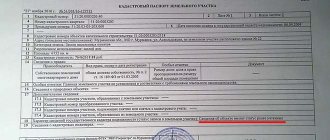Foreclosure of a land plot
The Leninsky District Court of Voronezh, as a measure to secure the claim, seized the land plot owned by the debtor. Referring to para. 1 and 3 paragraphs 1 art. 446 of the Code of Civil Procedure of the Russian Federation, the debtor appealed this determination. The cassation court left the private complaint unsatisfied, pointing out that the prohibition of foreclosure under writs of execution on land plots, the use of which is not related to business activities, does not mean a prohibition of seizure of such plots in order to secure a claim. Executing the court decision that entered into legal force to collect funds from the debtor, the bailiff seized this land plot as part of enforcement proceedings, but with reference to Art. 446 of the Code of Civil Procedure of the Russian Federation, the court declared his actions illegal.
Seizure of the debtor's land plot by bailiffs: causes and consequences
Seizure of a land plot by court decision is made during the trial to identify the owner of the plot. If there is a reasonable fear that the disputed land will be alienated before the end of the court case.
We recommend reading: In the Management Company Welders Should Work With What Discharge
When can land be seized?
Removing the seizure of a land plot begins with a statement of intention to the judicial authority. To do this correctly, saving time and money, you need to take into account a number of conditions:
- The appeal should be made in the form of a statement of claim.
- The claim is filed by the owner-debtor, other shared owners of the plot or representatives by notarized power of attorney.
- The application must contain the basis for lifting the arrest: confirmation of repayment of the debt, and so on.
- The requirement must be supported by evidence: a certificate of ownership; court decision on arrest (determination - if there was an arrest of the land plot by court decision, by a bailiff’s decision); debt payment receipts and other documents.
- The consideration of the case is accompanied by the payment of a state fee. Its size is determined by the cadastral value of the site.
- The statement of claim and attached documents must be filed with the court in person or sent by registered mail with acknowledgment of receipt.
The fee will be five times the minimum if the debtor refused not to return the money, but to perform some action, for example, eviction from an apartment or demolition of an illegal building. That is, they will take 5,000 rubles from a person or individual entrepreneur, and 50,000 rubles from an organization.
Can my only home be seized for debt?
- personal plots of land or part of the land on which a residential property is built. At the legislative level, it is possible to alienate real estate only with land, which is the basic basis;
- household items of the debtor. Jewelry or luxury items can be confiscated, but personal belongings associated with the debtor’s individual use cannot be confiscated;
- equipment or other items directly related to professional activities;
- livestock, plant seeds. Provided that the debtor needs them to provide for himself and his family, and not for sale;
- food and cash, the total amount of which is not less than the subsistence level.
Can bailiffs seize a land plot registered with a mortgage?
Property that cannot be levied under enforcement documents1. Execution under executive documents cannot be applied to the following property owned by a citizen-debtor by right of ownership: - residential premises (parts thereof), if for the citizen-debtor and members of his family living together in the owned premises, it is the only one suitable for permanent residence on the premises, with the exception of the property specified in this paragraph, if it is the subject of a mortgage and foreclosure may be made on it in accordance with the legislation on mortgage; - land plots on which the objects specified in paragraph two of this part are located, with the exception of what is specified in in this paragraph of the property, if it is the subject of a mortgage and foreclosure can be made on it in accordance with the legislation on mortgages; I would like to clarify with you that this house is not by chance being built with maternity capital funds!? GOOD SUCCESS TO YOU I HOPE YOUR POSITIVE FEEDBACK.
We recommend reading: Feeding Guide Voronezh
Since the debtor himself does not bring money, the funds are withdrawn from the accounts. It turns out that if the payment is late, the client is obliged to repay the loan ahead of schedule, plus accrued penalties. At the same time, the guardianship authorities can give consent if the parents have other residential property.
Seizure of property: what bailiffs can and cannot seize
If the bailiffs have completely seized an existing salary card or a card on which a pension was received, without leaving the minimum allowed amount on it, the person will also have to contact the FSSP with a request to lift the ban on the use of part of the seized funds. As proof that the money on the card was wages, you will need to attach certificates from the accounting department at your place of work.
We recommend reading: How much will it cost to inherit an inheritance in Lipetsk
What can bailiffs do?
The bailiff is obliged to fulfill the requirements of the writ of execution within two months. But in practice, it is not always possible to meet this deadline. If the debtor is a functioning legal entity with money in bank accounts, the situation is simple. But in other cases, it is very difficult to find the entire amount of debt from the debtor for two months.
How to delay a bailiff's visit
First of all, the bailiff is interested in money, because it can be used immediately after withdrawal. When the debtor does not have Russian rubles, the bailiff looks for bank accounts in foreign currency and precious metals. If there is no money in the accounts, the bailiff will carry out the court decision in a long way: search, seize and sell the property.
Furthermore, in accordance with Art. 79 of the Federal Law “On Enforcement Proceedings”, bailiffs cannot seize a plot if the debtor’s only home is located on it (an exception is possible only in cases where mortgaged property is involved).
- Initiating enforcement proceedings against the owner (for example, if you have a debt for alimony, be prepared for the fact that the FSSP may seize your real estate);
- The emergence of a dispute about the ownership of a land plot (in this case, an arrest may be imposed if there are fears that the land plot will be alienated before a court decision is made);
- Formation of tax debts (debt to the Federal Tax Service can also cause the seizure of your land plot).
Who can seize a plot of land?
- The decision to seize the land plot was made erroneously (for example, the plot does not belong to the debtor, but to his namesake);
- The grounds for arresting the land plot have disappeared (for example, the debtor has paid his obligations and paid his debts).
8.1. Good day. Yes, bailiffs can seize the right to lease a land plot. Federal Law of October 2, 2007 N 229-FZ (as amended on December 28, 2020) “On Enforcement Proceedings” Article 68. Compulsory enforcement measures
We recommend reading: Amendments to the Criminal Code of the Russian Federation 2020
1. The right of ownership and other real rights to immovable things, restrictions on these rights, their emergence, transfer and termination are subject to state registration in the unified state register by the bodies carrying out state registration of rights to real estate and transactions with it. The following are subject to registration: the right of ownership, the right of economic management, the right of operational management, the right of lifelong inheritable possession, the right of permanent use, mortgage, easements, as well as other rights in cases provided for by this Code and other laws.
Advice from lawyers:
A pledge is not a basis for prohibiting the imposition of any arrests/restrictions by supervisory and judicial authorities, but the pledge holder has a preferential right to satisfy his claims over third parties. My colleague's answer above is incorrect.
In its ruling (case No. 78-KG15-42), the board indicates that arrest as an enforcement action can be imposed by a bailiff “in order to ensure the execution of a court decision containing demands for property penalties” (Clause 7, Part 1, Art. 64 and part 1 of article 80 of the law on enforcement proceedings).
Experts interviewed by Pravo.ru support this point of view. “We should agree with the position of the RF Armed Forces,” says Pavel Khlustov, partner at the Barshchevsky and Partners Bar Association . — In this case, the arrest was imposed not for the purpose of foreclosure on the property, but in order to prevent the debtor from alienating the apartment. In such a situation, the seized property is not subject to forced sale in order to satisfy the creditor’s claims, but only creates the prerequisites for the debtor not to alienate it in bad faith or encumber it with the rights of third parties.” The lawyer finds that this decision will form the basis of new judicial practice. “It is very good that the RF Armed Forces recognized this line and resolved the case correctly. This precedent is intended to reverse the practice of lower courts, which usually recognize such arrests as illegal,” Khlustov clarifies.
The Plenum explained differently
Three judges of the Collegium for Civil Cases: Vladimir Khamenkov, Elena Gorchakova and Lyudmila Kalinina - considered the acts of the lower courts to be “incorrect and subject to cancellation”, since their conclusions are based “on an incorrect interpretation of the norms of substantive law.”
Having checked the validity of the arguments set out in the application and the speech of the representatives of the parties present at the court hearing, the Judicial Collegium for Economic Disputes of the Supreme Court of the Russian Federation came to the conclusion that the management’s application must be satisfied due to the following.
We recommend reading: After the bailiffs inventory the items, who can buy them back?
Is it possible to seize the debtor’s only home?
Contact the bailiff with a written request for seizure (hand over against signature on your copy or send by registered mail with notification). In your petition, try to justify why the absence of such a seizure may infringe on your interests as a claimant. If you have information about the debtor’s intentions to dispose of the only housing, be sure to write about this in the petition. It would also be nice if you can prove such intentions of the debtor with documents (provide printouts of advertisements for the sale of the debtor’s only home, etc.). If the bailiff does not respond to your petition, you will be able to appeal his inaction to a higher bailiff or to the court.
Can bailiffs seize a wife's property for her husband's debts?
At the same time, the court believes that the agreement of the Yakovlevs dated DD.MM.YYYY on the division of common property acquired during the marriage does not provide grounds for lifting the arrest from the apartment. By virtue of clause 1 of Art. 46 of the RF IC, the spouse is obliged to notify his creditor (creditors) of the conclusion, amendment or termination of the marriage contract. If this obligation is not fulfilled, the spouse is liable for his obligations, regardless of the content of the marriage contract. The court believes that the division of property carried out by the Yakovlevs violates the rights of the defendant’s creditors, since the obligations of Yakovlev A.V. arose and were brought for forced execution during the marriage, and the division of property was made without notifying creditors. In this regard, Yakovlev A.V. must be liable for obligations regardless of the content of the agreement on the division of common property.” On this basis, he has the right to block her bank account and collect the debt from her income. In other cases, when the husband spent the loan on needs that are not family and the wife was not a co-borrower or guarantor, the bailiff cannot foreclose on the wife’s share and her personal belongings, real estate or car. And also, bailiffs cannot describe the husband’s property when the debtor is the wife. The wife can protect her property rights; to do this, she needs to provide evidence that these funds, car or real estate are personal.
We recommend reading: Benefits for utility bills for liquidators of the nuclear power plant in Moscow
Family Code of the Russian Federation, concerning spouses in an official marriage (or in a civil marriage, if there are witnesses confirming the fact of cohabitation). Let's look at this provision of the law in more detail. Article 45 of the Family Code of the Russian Federation allows foreclosure on the common property of spouses for their common obligations or for the obligations of one of the spouses, if the loan funds were directed to the needs of the family.









